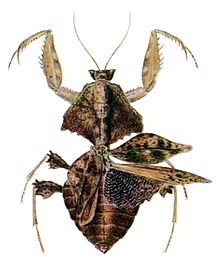
Mantidae is one of the largest families in the order of praying mantises, based on the type species Mantis religiosa; however, most genera are tropical or subtropical. Historically, this was the only family in the order, and many references still use the term "mantid" to refer to any mantis. Technically, however, "mantid" refers only to members of the family Mantidae, and not the 14 remaining families of mantises. Some of the most recent classifications have promoted a number of the mantid subfamilies to the rank of family, e.g. Iridopterygidae, Sibyllidae, Tarachodidae, Thespidae, and Toxoderidae, while other classifications have reduced the number of subfamilies without elevating to higher rank.

Empusidae is a family of plant-mimicking mantises, consisting of 10 genera, in two subfamilies. Unlike many other mantis families, the Empusidae are a monophyletic lineage. Empusidae mantises are ambush predators, with mouthparts adapted to feeding on other insects and small animals. The majority of Empusidae species are distributed throughout Africa, but they are also found in Southeast Asia and in the southern parts of Europe.
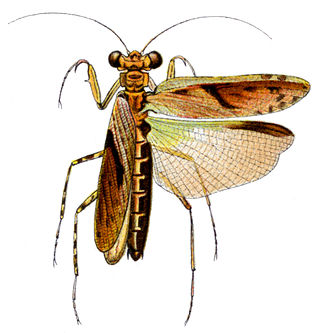
Amorphoscelidae is a family of mantises in the order Mantodea.

Liturgusidae is a family of praying mantises in the new (2019) Neotropical superfamily Acanthopoidea. A substantial number of genera, previously placed here, have recently been moved to the new or revived other families:
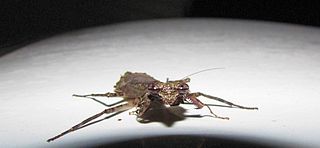
Gonatista is a genus of praying mantises in the family Epaphroditidae.
Titanodula fruhstorferi is a praying mantis species in the subfamily Hierodulinae.

Tarachodidae is a now obsolete family in the order Mantodea, of genera found in Africa and Asia.
Catoxyopsis is a genus of mantis in the subfamily Vatinae. It consists of a single species, Catoxyopsis dubiosa.
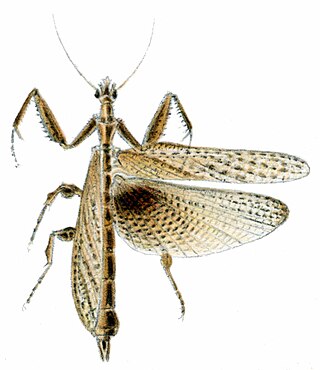
Stenophylla is a genus of praying mantis in the subfamily Stenophyllinae, which is now placed in the family Acanthopidae. It the sole genus of the tribe Stenophyllini.
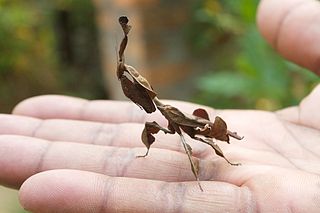
Deroplatyinae is a subfamily in the new (2019) family Deroplatyidae, containing species found in South-East Asia.

Tenodera aridifolia is a species of mantis in the subfamily Mantinae. The Chinese mantis, T. sinensis, was once considered to be a subspecies of T. aridifolia, but the species can be distinguished by the shape of male genitalia.
Deroplatyini is a tribe of the subfamily Deroplatyinae of the family Mantidae of Mantodea.
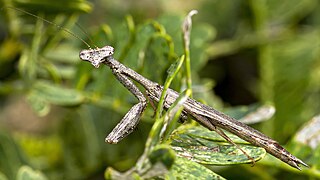
Callimantis is a genus of mantis of the family Epaphroditidae consisting of only one species, Callimantis antillarum.
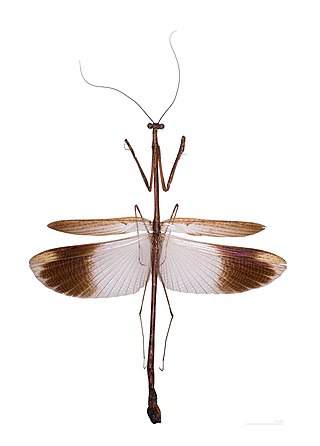
Angelidae is a family of mantises found in tropical Central and South Americas.

The Hierodulinae are a subfamily of praying mantids, originally used by Brunner von Wattenwyl. It was restored as part of a major revision of mantid taxonomy, and now contains genera previously placed elsewhere in the family Mantidae.
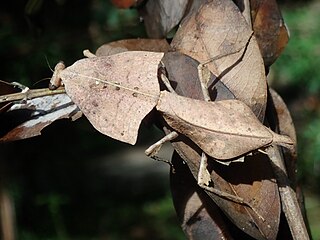
The Deroplatyidae are a new (2019) family of praying mantises, based on the type genus Deroplatys. As part of a major revision of mantis taxonomy, the subfamily Deroplatyinae has been moved here from the previously-structured family Mantidae.
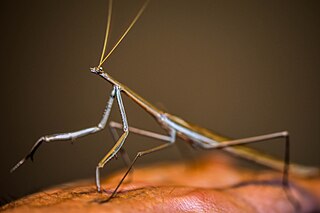
Hoplocoryphidae is a newly erected (2019) family of praying mantids, based on the type genus Hoplocorypha. As part of a major revision of mantid taxonomy, genera have been moved here from the subfamily Hoplocoryphinae of the previously polyphyletic family Thespidae. The family Hoplocoryphidae is the only member of superfamily Hoplocoryphoidea. Species in this family have been recorded from tropical Africa.
Dactylopterygidae is a family of praying mantises, based on the type genus Dactylopteryx. The first use of "Dactylopterygidae" was by Giglio-Tos and it has recently (2019) been revived as part of a major revision of mantis taxonomy; three genera have been separated from others in the subfamily Liturgusinae and moved here from the family Liturgusidae.

Eomantis is a genus of praying mantis in the subfamily Tropidomantinae and tribe Tropidomantini, with species recorded from Asia.

Titanodula is a genus of mantids in the subfamily Hierodulinae. There are currently five species placed in Titanodula. The genus is endemic to Asia and is distinguished from the similar genus Hierodula by the large size and unique male genitalia of its member species.
